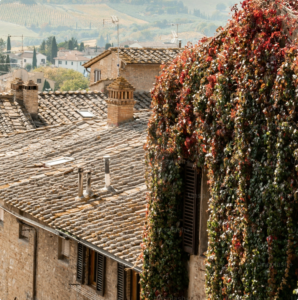Nestled in the heart of the Chianti Classico region, Castello di Brolio boasts a history that stretches back to the 10th century. Originally constructed as a defensive fortress, the castle’s imposing presence served as a sentinel, guarding the strategic routes between Florence and Siena. It was here, within the walls of the Brolio castle , that Barone Ricasoli pioneered the production of Chianti Classico wine and subsequently Castello di Brolio wine, so if you’re wondering what region is home to the oldest italian winery-it’s Siena. The legacy of Castello di Brolio, or Castle of Brolio as it translates to in english, draws visitors from around the world to explore its storied halls and taste the renowned wines of the Castello di Brolio winery. As visitors wander through the vineyards of Castello di Brolio, they’re instantly transported back in time, experiencing the timeless beauty and rich cultural heritage of Tuscany while enjoying castello di brolio chianti classico. The chianti castle stands as a testament to the enduring spirit of the Ricasoli family and their dedication to preserving the traditions of Italian winemaking. Today, the castle of Brolio continues to enchant and inspire, offering a glimpse into the past while embracing the future of Chianti Classico wine production.
The Ricasoli Legacy
In the 12th century, the castle passed into the hands of the illustrious Ricasoli family, marking the beginning of a legacy that would shape the destiny of Tuscany. As patrons of the arts, scholars, and statesmen, the Ricasolis wielded influence far beyond the walls of their fortress. However, it was their passion for winemaking that left an indelible mark on Tuscan culture.
A Vineyard of Distinction
At the heart of the Castello di Brolio DOCG wine lies a vineyard that epitomizes the spirit of Tuscan winemaking. With its sun-kissed slopes and mineral-rich soil, the estate’s vineyards yield grapes that fill its cellars with unparalleled quality, including the iconic Sangiovese varietal. Under the stewardship of the Ricasoli family, the estate’s wines have earned international acclaim, embodying the essence of Chianti Classico.
A Fusion of Architecture and Artistry
Castello di Brolio’s architectural ensemble is a testament to the region’s rich cultural heritage. From its rugged stone walls to its elegant courtyards, the castle seamlessly blends medieval fortifications with Renaissance elegance. Visitors are invited to explore its storied halls, where centuries-old frescoes and artifacts offer glimpses into Tuscany’s past.
Wine Tasting and Tours
For wine enthusiasts and history buffs alike, a visit to Castello di Brolio is an opportunity to indulge in the finer pleasures of life. Guided tours lead visitors through the castle’s halls, recounting tales of medieval intrigue and Renaissance splendor. Wine tastings offer a sensorial journey, allowing guests to savor the nuanced flavors of Chianti Classico wines crafted with centuries of expertise
Embracing Tuscan Hospitality
Beyond its historical and viticultural significance, Castello di Brolio embodies the spirit of Tuscan hospitality. Whether dining al fresco amidst the vineyards or partaking in a traditional Tuscan feast, visitors are welcomed as honored guests, invited to share in the timeless rituals of Italian culture.
A Window into Tuscany’s Soul
Castello di Brolio is more than a castle; it is a living testament to Tuscany’s enduring spirit. As the sun sets over the vineyards and the gentle breeze carries the scent of ripening grapes, one cannot help but feel a sense of reverence for this timeless land. In Tuscany, where the past meets the present, Castello di Brolio stands as a reminder of the beauty and resilience that define the Tuscan soul.
In Conclusion
In a region steeped in history and tradition, Castello di Brolio shines as a beacon of Tuscany’s timeless charm. Its walls echo with the whispers of centuries past, inviting travelers to embark on a journey through time. As we bid farewell to this storied fortress, may we carry with us the memories of its beauty and the taste of its wines, forever etched in our hearts.

